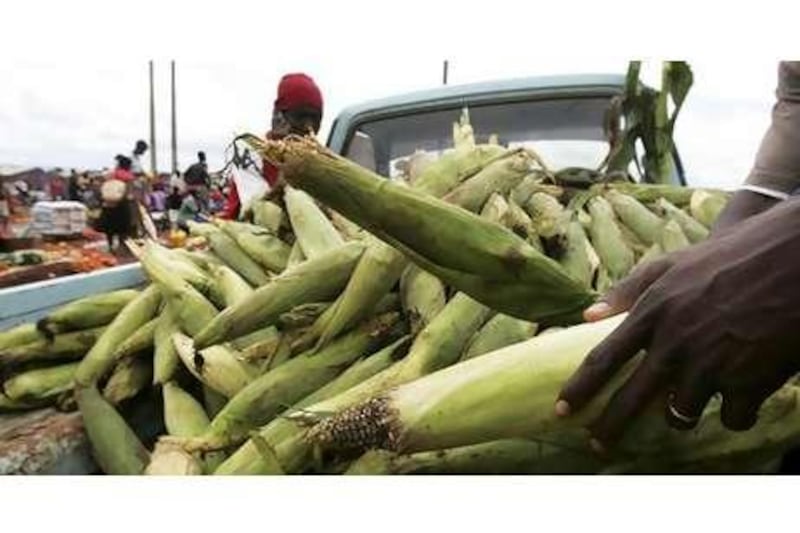HARARE // Zimbabwe has rejected genetically modified maize as food aid for its hungry population after raising health and environmental concerns. About 2.2 million Zimbabweans - almost 16 per cent of the national population - need emergency food aid because low seasonal rains resulted in widespread crop failure, according to the Famine Early Warning Systems Network (Fewsnet), a Washington-based global food security organisation.
The government estimates that 500,000 tonnes of the staple corn are needed to feed the hungry between now and the next harvest, expected in April, provided the agricultural season is successful. With limited resources, as the country slowly emerges from a decade of economic crisis, the food deficit would again be met by international aid, most of which comprises genetically modified foods. "The government's position on unmilled GM maize has not changed," Joseph Made, the agriculture minister, told The National in a recent interview.
"We took a position in 2002 that we will not accept unmilled maize. If we are to get any maize, it has to be milled first before it is distributed. Yes we have a section of our population in need of assistance, but that does not mean that we accept maize that can pose long-term impact on their heath and our farm produce, which has always been organic." Genetically modified organisms are plants or animals whose genes are artificially altered to enhance yields and resistance to pests and diseases. Most farm produce in Europe and North America is genetically modified. In Africa, South Africa is the biggest producer of GM foods.
Critics of GM foods argue that they can cause allergies in sick people and resistance to antibiotics. But proponents of genetically modified foods say that there is no solid scientific evidence that they are harmful. Growing GM crops in Zimbabwe, which is essentially an organic agriculture producer, Mr Made said, could "contaminate local crop varieties" through cross-pollination. When the government first turned down GM food aid in 2002, Mr Made, who was agriculture minister then as well, said he could not allow the hungry population to be "used as guinea pigs".
In January, he rejected a request by grain millers to import GM grain for local milling, saying the businesses could better use the money set aside for imports to support domestic agriculture to boost production. Sheunesu Mpepereki, a soil science professor at the University of Zimbabwe in Harare, said that if unmilled maize is imported, there is no guarantee that poor farmers, who cannot afford to buy seed maize, will not use the aid as seed.
"Just because we are hungry does not make us accept food which we do not like," said Mr Mpepereki, who is also the chairman of the National Soya-bean Taskforce, a grouping of farmers who specialise in growing soya beans. "In any case, I do not think that our hunger is so desperate that we can mortgage the long-term future and purity of our farm produce. Hunger is not permanent." He warned that Zimbabwe could lose markets that don't allow GM produce if it allows contamination of its farm produce by GM seeds.
"Recently, the National Soya-bean Taskforce received an inquiry from a prospective client in Europe who requested for non-GM Soya beans. So if we allow GM products and seed into the country, we lose that market," he said. Since 2008, the government has allowed duty-free importation of foodstuffs in an effort to avert hunger. Large amounts of processed GM foods such as chicken, corn meal and milk continue to flow into the country, mainly from South Africa and Brazil.
"I recall that there was GM maize meal on the local market a few months ago, which was marked 'not suitable for children under the age of 13'. What does that tell you about GM foods? We have been eating them because we had no choice, not now," said Noah Mataruse, 35, of the Mbare suburb in Harare. Christopher Chetsanga, the president of the Zimbabwe Academy of Sciences, said the ban on unmilled GM maize is based on emotions, not science.
"These foods go through rigorous scientific research before they are released on the market," Mr Chetsanga, a professor of biochemistry, said. "In the US, for instance, they have been eating GM food for the past 12 years, but the people there are healthier than we are. They allow their people to eat the foods, not because they don't care about them. This talk about GMOs being harmful to health is backward. I find it embarrassing."
Non-governmental organisations, which distribute food aid to the needy, want more research to prove whether GM foods are harmful. Cephas Zinumwe, the head of the National Association of Non-governmental Organisations, said: "Our food security needs must be realised, but at the same time there must be a balance with the need to promote the health of our people." @Email:foreign.desk@thenational.ae





